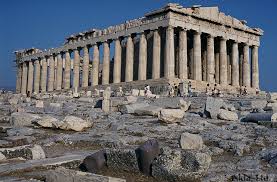Greece cannot hope to benefit from EU cultural repatriation rules to get back the Parthenon Marbles from Britain in the event of Brexit, the European Commission said Thursday.
Responding to a Greek euro deputy's query, EU education and culture commissioner Tibor Navracsics said bloc directives on the repatriation of national treasures apply in cases dating from 1993 onward.
"None of these directives can be applied in this case, as the Parthenon Marbles were removed in the first half of the 19th century," Navracsics' office told Stelios Kouloglou, a euro deputy with the ruling Greek Syriza party.
The Parthenon sculptures are part of the collection popularly known as the "Elgin Marbles" which were removed from Athens by Lord Elgin in the early 1800s when he was ambassador to the Ottoman court.
The British parliament purchased the art treasures from Elgin in 1816 and gave them to the British Museum.
For three decades, Greece has called for the return of the sculptures, which decorated the Acropolis of Athens for more than 2,000 years.
A 2014 poll showed only a quarter of Britons believe that the sculptures should remain in the British Museum.
Half of the respondents to the YouGov survey published in the Times said the artifacts should be returned to Greece, with a quarter undecided.
Elgin insisted he had permission to take the works from the Ottoman Empire, which ruled Greece at the time.
[elethos.gr/AFP]
12/10/17
Responding to a Greek euro deputy's query, EU education and culture commissioner Tibor Navracsics said bloc directives on the repatriation of national treasures apply in cases dating from 1993 onward.
"None of these directives can be applied in this case, as the Parthenon Marbles were removed in the first half of the 19th century," Navracsics' office told Stelios Kouloglou, a euro deputy with the ruling Greek Syriza party.
The Parthenon sculptures are part of the collection popularly known as the "Elgin Marbles" which were removed from Athens by Lord Elgin in the early 1800s when he was ambassador to the Ottoman court.
The British parliament purchased the art treasures from Elgin in 1816 and gave them to the British Museum.
For three decades, Greece has called for the return of the sculptures, which decorated the Acropolis of Athens for more than 2,000 years.
A 2014 poll showed only a quarter of Britons believe that the sculptures should remain in the British Museum.
Half of the respondents to the YouGov survey published in the Times said the artifacts should be returned to Greece, with a quarter undecided.
Elgin insisted he had permission to take the works from the Ottoman Empire, which ruled Greece at the time.
[elethos.gr/AFP]
12/10/17

No comments:
Post a Comment